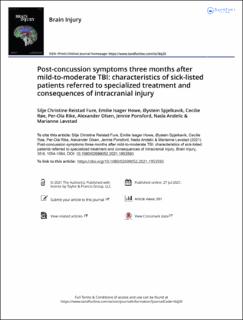Post-concussion symptoms three months after mild-to-moderate TBI: characteristics of sick-listed patients referred to specialized treatment and consequences of intracranial injury
Fure, Silje Christine Reistad; Howe, Emilie; Spjelkavik, Øystein; Røe, Cecilie; Rike, Per-Ola; Olsen, Alexander; Ponsford, Jennie; Andelic, Nada; Løvstad, Marianne
Peer reviewed, Journal article
Published version
Permanent lenke
https://hdl.handle.net/11250/2787083Utgivelsesdato
2021-07-27Metadata
Vis full innførselSamlinger
Originalversjon
https://doi.org/10.1080/02699052.2021.1953593Sammendrag
Objective: To present pre-injury, injury-related, work-related and post-injury characteristics, and to compare patients with and without traumatic intracranial abnormalities, in a treatment-seeking sample with persistent post-concussion symptoms (PPCS) after mild-to-moderate TBI. Methods: Cross-sectional design in the context of a specialized TBI outpatient clinic. Eligible patients were aged 18–60 years, employed ≥ 50% at time of injury, and sick listed ≥ 50% at inclusion due to PPCS. Data were collected 8–12 weeks after injury through review of medical records, semi-structured interviews, questionnaires, and neuropsychological screening. Results: The study included 116 patients, of whom 60% were women, and predominantly white-collar workers in full-time positions. Ninety-four percent had a mild TBI, and 23% had intracranial abnormalities. The full sample reported high somatic, emotional, and cognitive symptom burden, and decreased health-related quality of life. Patients with normal CT/MRI results reported higher overall symptom burden, while patients with intracranial abnormalities had worse memory function. Conclusion: Injury severity and traumatic intracranial radiological findings should not be the sole ground for planning of rehabilitation service provision in patients with PPCS, as subjective complaints do not necessarily co-vary with these variables.
Utgiver
RoutledgeSerie
Brain Injury;Volume 35, 2021 - Issue 9Tidsskrift
Brain InjuryOpphavsrett
© 2021 The Author(s).
Med mindre annet er angitt, så er denne innførselen lisensiert som Attribution-NonCommercial-NoDerivatives 4.0 Internasjonal
Beslektede innførsler
Viser innførsler beslektet ved tittel, forfatter og emneord.
-
Relationship between competency in activities and post-concussion symptoms after traumatic brain injury
Sveen, Unni; Bautz-Holter, Erik; Alvsåker, Kristin; Sandvik, Leiv; Røe, Cecilie (Scandinavian Journal of Occupational Therapy;17 (3), Journal article; Peer reviewed, 2010-09)Objective: To determine to what extent injury severity and post-concussion symptoms after 3 months predict ability in activities 12 months after traumatic brain injury (TBI) and assess the frequency of problems in daily ... -
Feasibility of a cognitive rehabilitation program for individuals with mild-to-moderate traumatic brain injury: Participants’ engagement and satisfaction
Howe, Emilie; Løvstad, Marianne; Langlo, Knut-Petter; Hellstrøm, Torgeir; Spjelkavik, Øystein; Ugelstad, Helene; Twamley, Elizabeth; Hadzic-Andelic, Nada (Cogent Medicine;Volume 6, Journal article; Peer reviewed, 2019-01-03)Purpose: To assess the feasibility of recruitment procedures and delivery of a Norwegian adaptation of a manualized cognitive intervention to a civilian sample with traumatic brain injury (TBI). Materials and methods: Six ... -
Feasibility of a cognitive rehabilitation program for individuals with mild-to-moderate traumatic brain injury: Participants’ engagement and satisfaction
Howe, Emilie; Løvstad, Marianne; Langlo, Knut-Petter; Hellstrøm, Torgeir; Spjelkavik, Øystein; Ugelstad, Helene; Twamley, Elizabeth; Hadzic-Andelic, Nada (Cogent Medicine;(2019), 6: 1565614, Journal article; Peer reviewed, 2019-01-08)Purpose: To assess the feasibility of recruitment procedures and delivery of a Norwegian adaptation of a manualized cognitive intervention to a civilian sample with traumatic brain injury (TBI). Materials and methods: Six ...

